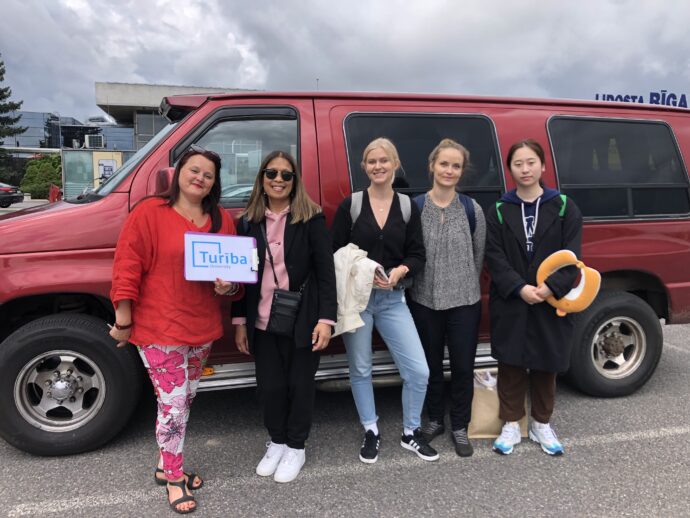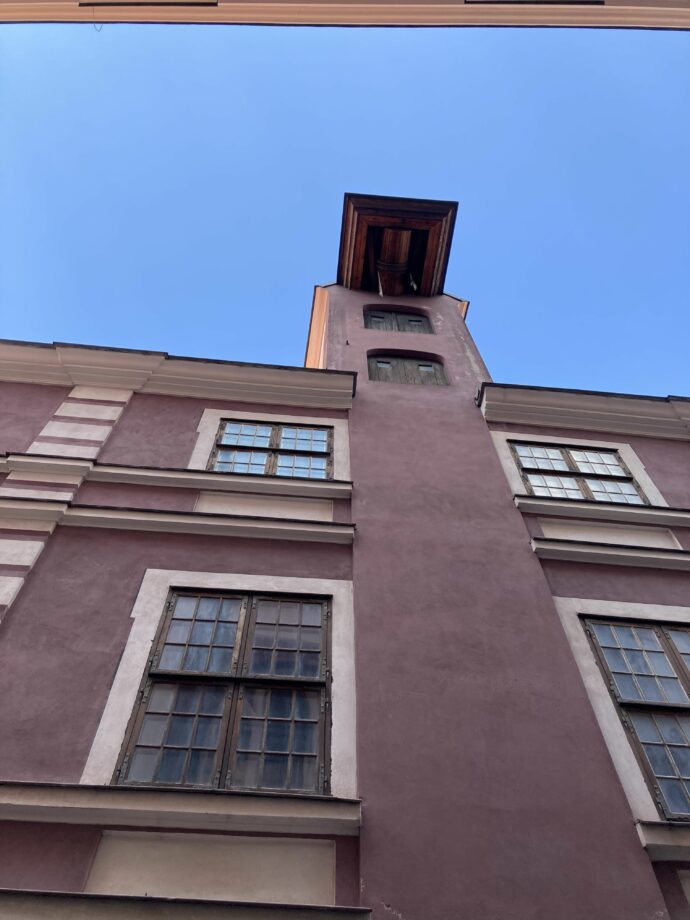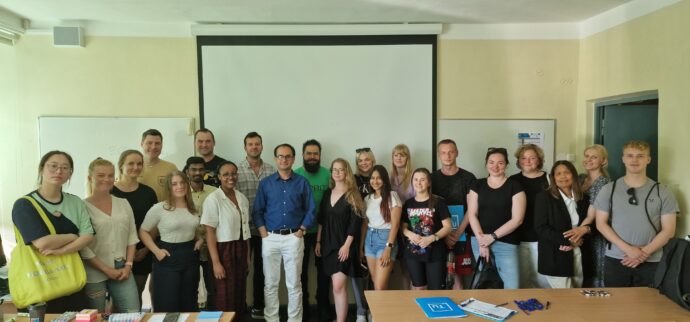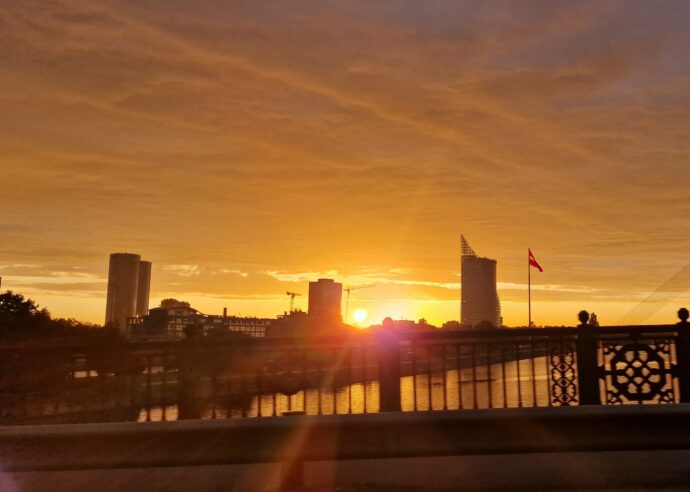In July 2022, five students and one teacher from Laurea University of Applied sciences attended the intensive course “Security and Sustainability 2022” in Latvia, organized by Turība University, the largest private university in the Baltics (Turība University, 2022). The course was 10 days long and consisted of various lectures and lessons, as well as intercultural events. In this article, the attendees from Laurea will describe the organization and content of the course and discuss their experiences.
The organization of the course
“Security and Sustainability 2022” was financed by the Nordplus Higher Education Programme, which aims to strengthen and develop Nordic educational cooperation. The aim of the Programme is to create a collaboration between the institutions that participate in the programme through exchanges, experience, good practice, and innovative results. The Programme is meant for university colleges in the Nordic and Baltic countries. The minimum requirement for a network and partnership is that they consist of at least three institutions from three different participating countries. (Nordplus 2022)
Laurea participated in the application process to Nordplus, as the benefits were clear: the students could attend an interesting international event with minimal financial investment, learning new things, advancing their studies and gaining more international experience. “Short courses such as this, from one to two weeks, are an excellent way to get some international experience for students who can’t attend full semester exchanges for whatever reason”, says Kaci Bourdache, a senior lecturer in the Safety, Security and Risk Management programme at Laurea. He continues: “In fact, the demand was greater than the supply in this case. The ERASMUS+ exchange program offers wonderful opportunities for long exchange periods, but funding and organizing short courses such as this require active effort. Turība University has been very vital in this regard, so we were very happy to participate”.
In addition to Laurea from Finland, other participating universities were from Estonia and Lithuania. However, that barely scratched the surface when compared to the background of the students taking part – in addition to these countries, some of the students themselves were originally from Germany, India, Indonesia, Iran, Italy, South Africa, Sri Lanka, and the United Kingdom. There was also a wide variety in the ages and study programmes of the students participating. While most of the Laurea University of Applied Sciences’ students did come from the Safety, Security and Risk Management background, the intensive course was intended to be applicable also for those who aren’t studying the field. The students ended up also meeting people who studied for example international business, law, marketing, rehabilitation – not to mention that many participants had previous degrees or work experience that gave them unique insight.
The course was well organized, and the ten-day schedule consisted of lectures, meal breaks, and free time activities, all organized by Turība University. Overall, there were had 11 lectures regarding security and sustainability, and additional lectures introducing the Latvian culture and the course itself. The lecturers were all provided by partnering universities as well.
In addition to the course itself, the students were also provided with the flights, accommodations, three meals a day, and Riga public transportation cards. Rooms were provided in Turība’s student hostel. The staff was a highlight of the trip, being very hospitable; even providing transports from and to the airport. In the evening of the first Monday and first day of the course, the students started to familiarize themselves with the city and the group.
In Viivi’s opinion “The first day was the most exciting day. When we landed, we were welcomed by Ieva Bruksle, and she took us to the campus with her stunning old van. After we arrived to the campus Ieva helped us to check in and with all the practicalities before the first day of the course. I felt very warmly welcomed to Latvia and to the campus.”
 Ieva Bruksle picking some of the students arriving from Helsinki. Photo by Viivi Aslamo.
Ieva Bruksle picking some of the students arriving from Helsinki. Photo by Viivi Aslamo.
Meanwhile, each visiting lecturer was offered a two-night stay in a nearby Riga hotel. During their stay, the lecturer obviously had their own pre-determined study session to give, but they were also free to participate in other scheduled program that took place during their stay.
Student’s perspective on the first week: a gentle touchdown with soft skills
 Photo of a warehouse in Riga old town. Photo by Salla Redlin.
Photo of a warehouse in Riga old town. Photo by Salla Redlin.
Tuesday marked the official start of the intensive course, focusing on introductory side of things, providing us context on the course, on our fellow students, and how things are run in Turība. Andris Geidân provided us with a lecture regarding, well – everything Latvian. From Latvian mythology, what makes Latvian a Latvian, to a tour of Riga. His knowledge of the town and history being what it was, it shouldn’t have come as a surprise that we even had a tourist join up on listening. After the excursion, the first day finished with a dinner in Lido, a Latvian restaurant chain that has taken over Baltics.
Salla’s thoughts about the first day in Turība: The teacher of the Latvian culture, Andris Geidãns walked us through the cobbled old streets and told us a lot about the history of the port city as a trading center. He also talked about buildings and the original purpose of their floors; only the lower floors were used for living, the upper floors were intended for storage, because the river that runs through the city often flooded and water rose up into the houses. There were winches outside the houses, which were used to lift the goods to the upper floors. Riga has been an important trading port since the 12th century.
On our first week the lessons we had were about leadership, stress management on crisis situations, sustainability and legal design, sustainability in general and what it means for energy security in the European Union, megatrends in security environment as well as cybersecurity. The courses gave us a general understanding to security and sustainability but also knowledge about the tools and techniques how they are used in different contexts and what it means in national and international levels. During the lectures we experienced variety of teaching and working methods that also lead to conversations within class.
Gesilla described the first week’s lecture on leadership like so: There are three topics /areas of the lecture that increases my motivation, expand, and strengthen my own knowledge and my understanding about Leadership. To be a good leader you must know the skills of leadership, leadership styles, the ways to improve your leadership skills and leadership guide for handling conflict. After this lecture I could say that I will apply and will put into practice all the characteristics of good leader.
In Viivi’s opinion “One of my favorite lectures was held by Javad Keypour who came from Estonian university. He teached us about the sustainable transition and what does it mean for EU energy security. It is a very topical subject and I got super focused on his lecture. I got inspired by his lecture and will probably focus some ways more towards energy security in the future in my studies.”
 Javad Keypour and our course after the lecture in classroom. Picture by Leo Ronkainen.
Javad Keypour and our course after the lecture in classroom. Picture by Leo Ronkainen.
Before the string of lessons could get too heavy for us, they were interjected with an intercultural evening. For that, every group brought things in that were intended to highlight their country’s peculiarities. Furthermore, dances, quizzes, and songs were used to provide further context and engagement, including a group work-out masquerading as a circle dance.
Before we could enjoy our less intensive weekend, we still had to return to core of the course. With sustainability by Turības Ieva Brukse, Megatrends by Laurea’s very own Kaci Bourdache, and cybercrime and cyber terrorism by Dalia Perkumienė. These topics, especially considering the varied backgrounds, really put the lecturer on the spot. As the topics are hard by their own rights but they need to be presented in a way where you do not assume previous knowledge. Much to our pleasure, Kaci’s lessons stuck, and were fondly remembered even by those without background in safety and security.
With the weekend rolling in, Saturday saw us in a team building exercises, where our groups were broken by use of bracelets. This broke up cliques and made us interact across nationalities. Games themselves were varied, but by the end of them you could see people worn out – good thing then that this was followed up by a riverside picnic of sorts, with ability to either swim or take stand-up paddle boards for a spin in Daugava. Considering the nature of the events, it was a pleasant decision that Sunday was a day off, with nothing on the schedule – time to recharge batteries and prepare.
Student’s perspective on the second week: Diving deep into the security
As Sunday turned into Monday, more heavy topics were on the way. But unfortunately, our lecturer on sustainable security business had an accident, leaving us without a lesson. Turība pulled some strings, and Ivo Krievs’ lecture on data protection was pulled to the morning slot, leaving us with rest of the day off. While not official, we ended the day with a short trip to Jurmala; well worth it for anyone ever finding themselves anywhere near the area. And while Monday turned well, sunburns might have been a risk that wasn’t totally mitigated during the day – something to take to heart in the future.
Tuesday returned us to reality, with Holger Mölders’ lecture on ways to approach international security challenges. We were provided with 51 pages of reading materials in advance for this lecture. This should illustrate the complexity spike that was taking place towards the end of the course. However, on Tuesday and Wednesday of the second week, the days had only one lecture, and one activity. This helped us to better absorb the lecture material and to avoid overworking. As for the activities, we partook in traditional, and less traditional, games organized by Turība.
In Salla’s opinion, the most interesting lecture was about information warfare by Holger Mölder. The lecture was topical and discussed about global knowledge warfare, including psychological warfare, influence and cyber operations, conspiracy theories, and “Hollywoodization”. The modern psychological warfare shapes information rather than physical supremacy – cyber warfare, information warfare, psychological warfare in addition to stimulating various forms of hybrid warfare, aiming to destroy the opponent’s psyche instead of focusing on materialistic gains that have been more familiar to the historical tradition of human society.
Considering the varied backgrounds of attendants, Wednesday’s lecture was highly interesting, with topic being global security & human rights protections in EU and risk management in the context of migrant crisis by Raimundas Kalesnykas of Kazimieras Simonavičius University. Unsurprisingly, this sparked a lot of conversation, and Raimundas further encouraged these, and provoked reactions in a well-moderated environment. Overall, the lecture did stand out in a very positive light. Following this was the practical part of stress management that took the form of a simulated event with different roles and different events. These were aimed to provide students with some degree of familiarity with crisis management, acting under pressure, and managing stress in these situations. This saw the group act out scenarios, with majority being either members in the situation – or those tasked to react and solve issues as portrayed.
Gessila commented that “The Stress Management in Crisis Situation was the best part of the course or the lecture. I was one of the negotiating team members and we are discussing face to face with the bad person and holding his gun in front of us. Convincing, negotiating with the bad guys in the scenario of 10 hostages. We need to beg the bad guy to release the hostages, but we need to provide him his demand to give him a key and a car, I feel the intense stress, fear and my whole body is shaking. This is the very unforgettable experienced that I had in this summer course. We managed to help the hostages out of the room but in real life situations we did a very bad move, because we just run away and left the bad guy free. We didn´t informed and call the authority and the police to report the hostage scenario. That is our huge error, the teacher told us that this really happens in real life situations. This was a unique situation, and one to remember.”
While the time flew by, there was no escaping Thursday’s exam and evaluation. The exam took somewhat of an alien form to us, having questions on a substance hardly ever seen during the pandemic – a paper. Considering the nature of intensive course, the sudden shift in learning style from a digital exam with the lecture material available that we were accustomed to, to a pen and paper test was noticeable, but not as bad as one might have thought. Following the exam, we had an overall debriefing conversation regarding the program and our thoughts on it. The final event saw everyone gather one more time at the “Hedgehog in the Mist” – or Ezītis miglā in Latvian, a chain of restaurants. There, we had the last day of camaraderie and put to rest our toil in Riga.
Conclusion
Teaching cooperation within the Nordplus area, i.e within Nordic and Baltic countries, has great potential. Physical distances are minor, geopolitical and societal concerns are similar, cultural differences are small but visible, and languages are varied. This combination gives a good opportunity for quick mutual understanding, while also giving true international experience to all parties. In addition to Nordplus, other funding instruments and opportunities should also be investigated, as that specific detail is of little concern to the actual student and their learning. Laurea is already cooperating with Turība University on an ERASMUS+ cooperation partnership in higher education, “Digital Education Tools for Security Risk Management”, also known as SECUREU. Within that partnership, an intensive course will be organized once again in Riga in July 2023 – and we expect the demand to participate once more to surpass the supply.
In Leo’s words: So, having spent those nine days, what were we left with? The immediate response that comes to mind is people. Again, this might be a product of the covid times, but I know no one from my class after a year and half besides my group. The fact that we had multiple students from safety, security, and risk management courses that I never had even dreamt of interacting with makes me few parts sad, few parts happy. They usually say that traveling expands one’s horizons. But if travel expands, then I suppose it is fair to say that studying abroad blows those horizons wide open.”
 Final evening in Latvia. Picture by Leo Ronkainen.
Final evening in Latvia. Picture by Leo Ronkainen.
Sources: